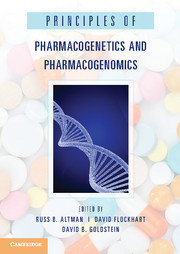Book contents
- Frontmatter
- Contents
- Contributors
- Introduction
- I Critical Concepts
- 1 Introduction to Population Diversity and Genetic Testing
- 2 Genotyping Technologies
- 3 Pharmacokinetics: Absorption, Distribution, Metabolism, Excretion Overview Chapter
- 4 Overview: Adverse Drug Reactions
- 5 PharmGKB, a Centralized Resource for Pharmacogenomic Knowledge and Discovery
- 6 DrugBank
- 7 Ethical Considerations for Pharmacogenomics: Privacy and Confidentiality
- 8 Informed Consent in Pharmacogenomic Research and Treatment
- 9 Legal Trends Driving the Clinical Translation of Pharmacogenomics
- II Therapeutic Areas
- References
5 - PharmGKB, a Centralized Resource for Pharmacogenomic Knowledge and Discovery
from I - Critical Concepts
Published online by Cambridge University Press: 05 June 2012
- Frontmatter
- Contents
- Contributors
- Introduction
- I Critical Concepts
- 1 Introduction to Population Diversity and Genetic Testing
- 2 Genotyping Technologies
- 3 Pharmacokinetics: Absorption, Distribution, Metabolism, Excretion Overview Chapter
- 4 Overview: Adverse Drug Reactions
- 5 PharmGKB, a Centralized Resource for Pharmacogenomic Knowledge and Discovery
- 6 DrugBank
- 7 Ethical Considerations for Pharmacogenomics: Privacy and Confidentiality
- 8 Informed Consent in Pharmacogenomic Research and Treatment
- 9 Legal Trends Driving the Clinical Translation of Pharmacogenomics
- II Therapeutic Areas
- References
Summary
Differential response to the standard dose of drug therapy in patients is commonly seen in clinical practice. Environmental factors, diet, age, gender, disease severity, interacting drugs, and genetic variation all contribute to the variability in drug response. The importance of genetic variation in drug response has become more prominent with the emergence of pharmacogenomics and personalized medicine. Pharmacogenomics is the study of how genetic differences affect responses to drugs. By knowing more about a person's genetic makeup, clinicians will be better able to assess the risks and benefits associated with medications to maximize treatment success. Pharmacogenomics has the potential to have an impact on many steps of medical care, from diagnosis to tailored drug prescription, and from basic drug discovery to clinical trial design.
In the past two decades, substantial knowledge has accumulated about genetic events contributing to differences in drug responses, some resulting in drug-labeling changes and clinical practices (1, 2). U.S. drug labels for 6-mercaptopurine, warfarin, and irinotecan contain dosage adjustments based on TPMT, CYP2C9 and VKORC1, and UGT1A1 genotypes (3–5). As the U.S. Food and Drug Administration (FDA) requires more pharmacogenomic information to be included on drug labels, pharmacogenomics will be increasingly accepted and integrated into mainstream clinical practice. We are already observing a steady shift from the “trial and error” approach to a more knowledge-guided personalized approach toward drug therapy. To realize the full potential of pharmacogenomics, many formidable challenges still need to be overcome. These challenges include the ethical, economical, and legal issues associated with the ever expanding field of genetic testing, as well as the strong need to increase genetic literacy among patients and health care providers. Easier access to well-characterized clinical outcome and biometric data on patients under treatment are also crucial to identify and track genotype-phenotype relationships. With the combined efforts of researchers and health care providers to use the knowledge of pharmacogenomics in drug treatment and diagnosis, the barriers between scientific discovery and the clinical application of pharmacogenomics will diminish over time to realize the full benefits of the field.
- Type
- Chapter
- Information
- Principles of Pharmacogenetics and Pharmacogenomics , pp. 38 - 54Publisher: Cambridge University PressPrint publication year: 2012



